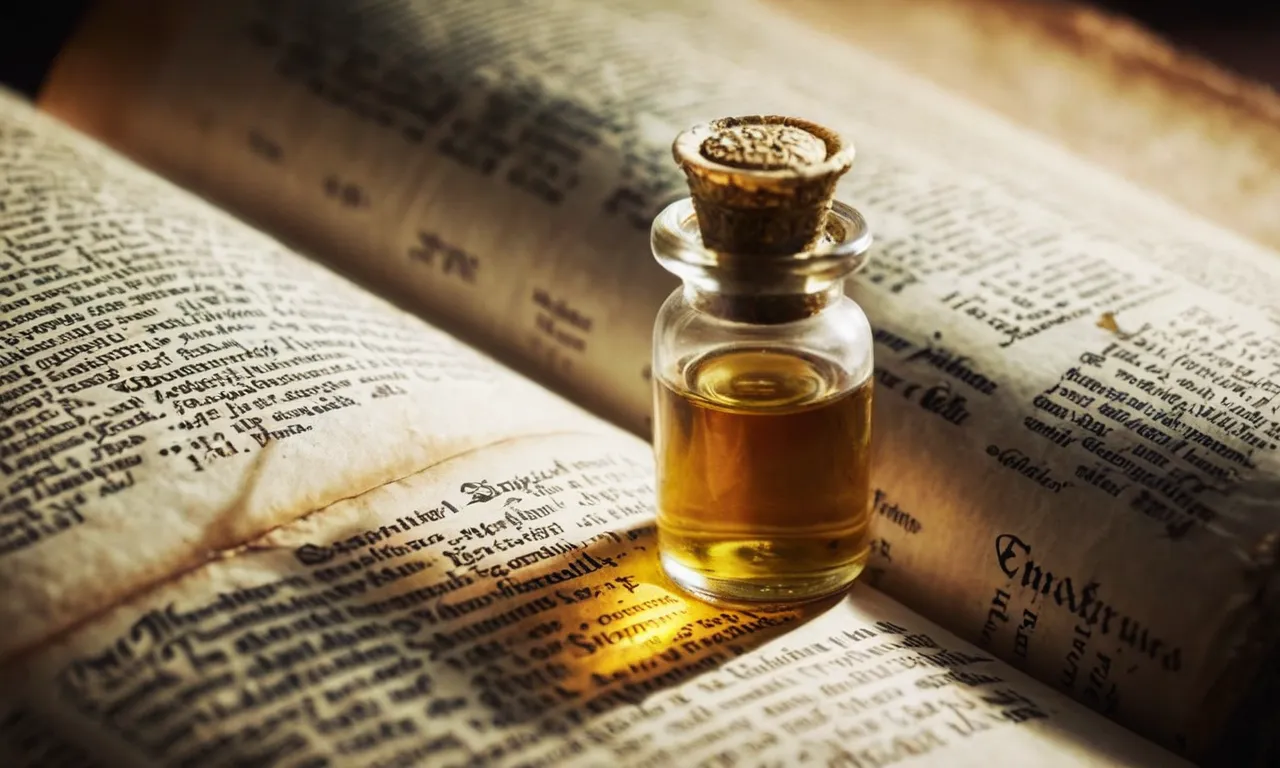What Is Nard In The Bible? A Comprehensive Guide
Nard is an aromatic ointment mentioned several times in the Bible. If you’re looking for a quick answer, here’s the gist: Nard is a perfume or scented oil derived from the spikenard plant that was used for anointing and burial rituals in biblical times.
In this comprehensive guide, we’ll explore everything you need to know about nard in the bible. We’ll look at what nard is, where it came from, how it was used, and the significance of its appearances in key biblical passages and stories.
What is Nard?
Definition and Origins
Nard, also known as spikenard, is an aromatic plant that has been prized for its fragrant oil for centuries. The plant grows in the Himalayan mountains of China, India and Nepal.
Composition and Properties
The fragrant oil derived from nard contains a number of bioactive compounds that give it antifungal, antibacterial, anti-inflammatory and antioxidant properties. The oil was and still is used in herbal medicine, cosmetics and perfumes.
In ancient times, nard oil was stored in alabaster boxes to preserve its precious aroma.
Uses and Cultural Significance
In biblical times and throughout the ancient Middle East, nard oil was regarded as an extravagantly luxurious substance. It was primarily used by nobility and the very wealthy.
The Bible references nard several times in both the Old Testament and New Testament, highlighting its great cultural value.
Most famously, as described in John 12:1-8, Jesus was anointed with costly pure nard oil worth 300 denarii (or nearly a year’s wages) by Mary, sister of Lazarus.
Even today, nard retains cultural and religious significance in Hinduism and Buddhism. The plant is considered holy and commonly used in the worship of various deities. As an aromatic ingredient and medicine, nard also continues to be highly prized in Ayurvedic traditions.
Nard in the Old Testament
Song of Solomon References
The Song of Solomon contains several poetic references to nard. In Song of Solomon 1:12, the woman compares her beloved to a sachet of nard, saying “While the king was at his table, my nard gave forth its fragrance.”
This demonstrates that nard was considered a precious, fragrant oil during Biblical times. In Song of Solomon 4:13-14, the man describes his beloved, saying “Your plants are an orchard of pomegranates with choice fruits, with henna and nard, nard and saffron, calamus and cinnamon, with every kind of incense tree.”
Here, nard is celebrated as one of the beautiful botanical treasures in the woman’s garden.
These references portray nard as a rare, exotic plant that was prized for its sweet, spicy scent. The comparisons in Song of Solomon use nard to represent beauty, richness, and love.
As a luxury item, nard oil would have been expensive and used sparingly in ancient Israel.
Banquet Imagery
Spikenard also appears in the context of banquet imagery in the Old Testament. In the Song of Solomon, banquet scenes depict the joys of love. The aromas from perfumes like nard would have contributed to the sumptuous environment.
Beyond the Song of Solomon, nard and other fragrances are mentioned alongside rich foods and wine in banquet descriptions. For example, in Esther 1:6-7, King Ahasuerus holds a lavish banquet displaying the riches of his kingdom.
Spikenard and other perfumes fill the courtyard as guests feast in an atmosphere of luxury and excess.
These banquet images represent celebration and blessing. The inclusion of rare fragrances like nard conveys the extravagance of these feasts.
As an imported luxury good, nard added to the decadence and indulgence of ancient royal banquets.
So in the Old Testament context, nard was associated with rarity, beauty, love, joy, luxury and opulence through its inclusion in romantic and banquet imagery. The biblical poets used this exotic aromatic to conjure sensations of delight and richness.
As a distinguished fragrance, nard conveyed sacred affection and worldly pleasure.
Nard in the New Testament
Jesus Anointed at Bethany
One of the most well-known Biblical stories involving nard is found in the New Testament, when Jesus was anointed with pure nard oil by a woman at Bethany (John 12:1-8). This account illustrates the high value placed on nard oil in ancient times.
As Jesus dined at the home of Simon the Leper, Mary (the sister of Martha and Lazarus) brought out an alabaster flask filled with about 12 ounces of pure spikenard oil, an extravagantly expensive ointment extracted from the roots of the nard plant grown in India.
She poured the perfumed oil over Jesus’ feet and wiped them with her hair.
The potent floral aroma filled the house. But the disruptive gesture drew criticism from some disciples who deemed it as wasteful when the oil could have been sold to help the poor.
Jesus however, recognized it as a prophetic act done to prepare his body for upcoming burial, and praised Mary’s expression of adoration.
The account highlights nard’s function beyond a cosmetic. The preciousness of Mary’s nard mirrors Christ’s impending self-sacrifice. His statement “the poor you will always have with you” also inspires much exegesis over societal obligations (Matt 26:6-13; Mark 14:3-9; John 12:1-8).

Nard in Burial Traditions
Nard and Embalming
In ancient times, nard oil was highly valued for its use in embalming and anointing the dead. The bible references using pure nard to anoint Jesus’ feet before his burial (John 12:3).
As an aromatic plant known for its rich, musky fragrance, nard was believed to mask unpleasant smells during the embalming process.
The oil was rubbed over the skin of the deceased before wrapping the body in linen cloths and spices.
Archaeological evidence shows nard oil containers found in tombs across Egypt and the Middle East. Analysis of residue confirms nard was a key ingredient used by ancient Egyptian embalmers when mummifying bodies for burial.
The antibacterial and antifungal properties of nard likely helped preserve human remains.
Other ancient texts reference using nard to prepare bodies for funerary rites. This suggests anointing with this precious oil was a common burial tradition spanning Jewish, Greek, and Roman cultures at the time.
The high value placed on nard oil made it a prestigious offering for departing loved ones.
Nard at Jesus’ Burial
The bible specifically mentions nard sprinkled on Jesus’ body as part of his burial preparations (Mark 14:8). This underscores the great honor afforded to him even in burial.
As nard was incredibly rare and expensive, reserving large quantities to cover Jesus’ body reflects profound devotion.
When Jesus praises Mary’s use of an alabaster jar filled with pure nard worth over 300 denarii to anoint his feet, he indicates this sacrifice in preparing his body beforehand (John 12:7).
This foreshadows the extensive spices like myrrh and aloes brought by Nicodemus to wrap Jesus’ body “in the Jewish way” before sealing the tomb (John 19:39-40).
The immense value placed on nard portrays Jesus as a king worthy of great honor. The use of this burial spice specifically aligns with ancient traditions in the highest echelons of society. This confirms Jesus’ royal identity even after his crucifixion and death.
The Significance and Symbolism of Nard
Status Symbol
In biblical times, nard was considered a luxury perfume or oil that only the wealthy could afford. It had to be imported from the Himalayan mountains in northern India, so it was scarce and expensive.
When Mary anointed Jesus’ feet with pure nard worth a year’s wages (John 12:3), it showed her great devotion but also demonstrated that her family had means.
The value of the nard she poured out on Jesus was staggering – no average person could have afforded such a lavish display. This makes her sacrificial act all the more remarkable.
Act of Devotion
By anointing Jesus with precious nard, Mary showed her immense gratitude and devotion to him. In those days anointing a guest’s head with oil was common courtesy, but Mary went above and beyond by pouring the oil over Jesus’ feet – a humble act displaying her love and care for her teacher.
Just a few days before his death, this act took on even greater meaning. Mary seemed to understand that Jesus would soon die, and she lovingly prepared him for burial in the Jewish custom of the time.
Her stirring display still stands today as one of the most beautiful acts of worship recorded in the Bible.
Preparation for Christ’s Death
Scholars believe Mary’s anointing of Jesus was a prophetic act foreshadowing his death. The Gospel writer John remarks that the house was filled with the fragrance of nard after Mary poured it out. This indicates the quantity used – a staggering 12-16 ounces!
Such excess echoes Old Testament accounts of kings being anointed for burial with huge amounts of spices. The timing is also significant – Jesus said Mary “anointed my body beforehand for burial” (Mark 14:8).
So while not everyone understood at the time, Mary likely sensed Jesus’ impending death and anointed him both out of devotion and in preparation for his burial.
Her lavish outpouring of nard foreshadowed his sacrificial death on the cross when his body would be wrapped in linen and spices.
Conclusion
In summary, nard is an aromatic oil derived from the spikenard plant that held great cultural, religious, and social significance in biblical times.
It was prized for its preciousness, used for anointing and embalming rituals, and took on symbolic meaning related to devotion and the identity of Jesus as messiah.







